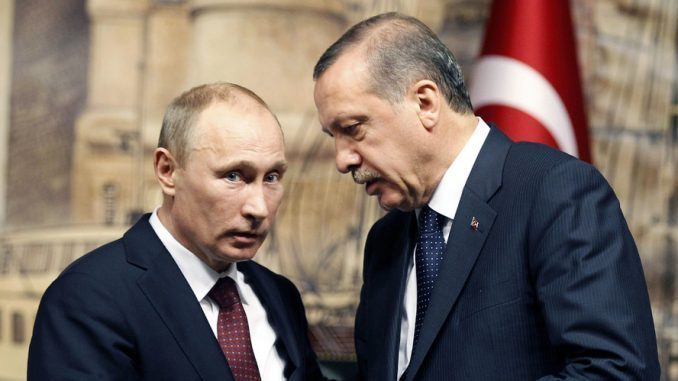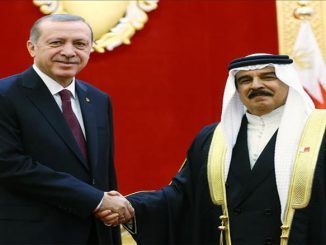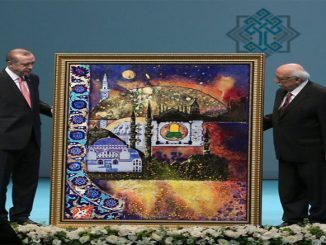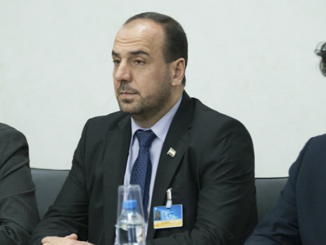
The meeting of foreign and defense ministers of Russia, Iran and Turkey about the future of Syria and the city of Aleppo at talks in Moscow on Tuesday became uncertain, as well as the Russian-Turkish relations after the assassination of the Russian ambassador in Ankara.
After months of crippling siege, starvation policy, daily bombardment, fierce clashes and bloody massacres the Assad regime and its allies were able to oblige the rebels in Aleppo to surrender and make an agreement to leave the area they have been holding since 2012 after losing more than 90% of it.
The ceasefire agreement was a result of talks between Russia and Turkey, and was opposed by Iran which sought to force its own conditions. Therefore, the three powers decided to meet and discuss the Syrian situation,
All three countries have emerged as important players in Syria, with Iran and Russia strongly backing President Bashar al-Assad, while Turkey, a NATO member, would like to see him step down.
“(The meeting) will be to understand the views of all three sides, laying out where we all stand and discuss where we go from here,” an official from Turkey’s foreign ministry told international media in Istanbul on Monday.
“It is not a miracle meeting, but will give all sides a chance to listen to each other,” the official said.
The Russian Defence Ministry said in a statement Tuesday’s meeting would focus on how the multi-year conflict in Syria could be resolved and on fulfilling U.N. Security Council resolutions.
The RIA news agency cited Russian Foreign Minister Sergei Lavrov as telling reporters:
“We hope to speak in detail and concrete terms with those who can really bring about an improvement in the situation on the ground, while our Western partners are busier with rhetoric and propaganda and aren’t influencing those who listen to them.”
The assassination of the Russian ambassador
However, this meeting in particular and the whole Russian-Turkish relations became under threat after the ambassador in Ankara was killed.
The Russian ambassador to Turkey has been shot dead by a police officer who shouted “Don’t forget Aleppo” as he pulled the trigger.
The chilling attack on Monday evening, which was captured on video, appeared to be a backlash against Russian military involvement in the Syrian crisis.
Andrei Karlov was attacked at the opening of an art exhibition in Ankara by a man believed to be an off-duty Turkish police officer. Karlov was several minutes into a speech when he was shot. Footage of the attack showed a man dressed in a suit and tie standing calmly behind the ambassador. He then pulled out a gun, shouted “Allahu Akbar” and fired at least eight shots.
After firing at the ambassador, the man shouted in Turkish: “Don’t forget Aleppo. Don’t forget Syria. Unless our towns are secure, you won’t enjoy security. Only death can take me from here. Everyone who is involved in this suffering will pay a price.”
He also shouted in Arabic: “We are the one who pledged allegiance to Muhammad, to wage jihad.”
Future of Russian-Turkish relations
The Russian and Turkish leadership, however, have presented a united front following the attack, announcing a joint investigation into the incident and emphasizing that ties between the two countries should be strengthened in light of Monday’s events.
The Russian president, Vladimir Putin, called the killing a “provocation” aimed at sabotaging a rapprochement between Moscow and Ankara and attempts to resolve the conflict in Syria.
“The crime that was committed is without doubt, a provocation aimed at disrupting the normalisation of Russian-Turkish relations and disrupting the peace process in Syria that is being actively advanced by Russia, Turkey and Iran,” he said in televised comments.
Putin said: “There can be only one answer to this – stepping up the fight against terrorism, and the bandits will feel this.”
Putin and Turkish President Tayyip Erdogan spoke on the phone on Monday night. Erdogan said the leaders agreed the attack was “wrecking the normalization of Russian-Turkish relations and the Syrian peace process.“
Turkish Prime Minister Binali Yildirim also stressed that the Turkish government will also not allow Karlov’s assassination to harm Russian-Turkish relations.
Yildirim said Monday’s attack on Russian ambassador came in a period when the two countries were closely working to find solutions to the regional problems. “It is certainly not a coincidence.”
Foreign Minister Mevlut Cavusoglu said also that the attack would not harm Turkish and Russian relations.
“It is known how important the relations with Russia are for the region and not only for two countries,” Cavusoglu said.
“Especially the recent evacuation of innocent civilians from Aleppo and efforts for a permanent cease-fire and a political solution was recognized by whole world,” he told reporters shortly after his plane landed in Moscow for trilateral meetings with Russia and Iran regarding Syria.
FETO hands in the case
THE mayor of Ankara has suggested Fethullah Gulen was behind today’s assassination of the Russian ambassador to Turkey.
He said the 22-year-old gunman was working on behalf of FETO, a designated terrorist organisation which the Turkish government believes Gulen controls.
At least 290 people, including the plotters, were killed during the events of July 15.
Tens of thousands of civilian and military state employees were sacked or detained following the incident in efforts to get rid of the followers of Gulen, seen as a terrorist organisation in Turkey.



